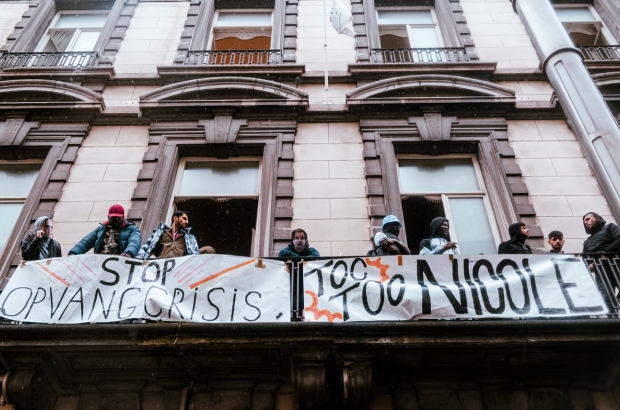- Daily & Weekly newsletters
- Buy & download The Bulletin
- Comment on our articles
Belgium owes millions in fines for its handling of asylum seekers
The Belgian state and its immigration department Fedasil owes tens of millions of euros in fines for their handling of the latest refugee crisis.
Several organisations representing asylum seekers have sued Fedasil, and the European Court has also issued fines and condemnations, but state secretary Nicole De Moor continues to refuse to pay penalty payments.
On 20 October, the total amount owed stood at more than €333 million, which De Moor disputed as being too high while adding, “it doesn't actually matter, we don't pay these penalty payments anyway”.
The Belgian system for receiving refugees has been overwhelmed since September 2021. Because families, minors and vulnerable people are given priority placement, dozens of mostly male asylum seekers are left sleeping on the streets of Brussels, despite a constitutional right to food and shelter.
It is on those constitutional grounds that refugees and associations that represent their interests are able to successfully sue.
“When a judge orders something to be done or not done, a penalty can be attached to that order,” lawyer and KU Leuven professor Benoit Allemeersch told Bruzz.
“A penalty is not compensation, but a kind of private fine. So you don't have to pay to the government, but to the person who obtained the order from the court.”
In the case of the refugee crisis, the Belgian government has been ordered to pay a penalty fine for every day it fails to provide mandatory reception to asylum seekers. The NGOs that took Fedasil to court would be the ones to receive the money.
“It can be appealed,” Allemeersch explained. “Broadly speaking, you can say that this is usually not the case for decisions on small amounts, but in cases like this one, you can assume it is.
"It is then up to the court to decide whether or not the order was justified, and whether or not the penalty imposed is part of that."
The court decides on the amount of the penalty, as well, which Allemeersch said must be proportionate to the situation and does not start being officially "owed" until the party is served the court order.
“As long as a party has assets, you can force them to pay via seizures,” said Allemeersch.
While the government could argue that seizing assets from it could compromise the services offered to citizens, Allemeersch said: “You are not going to tell me that the state has insufficient items to seize without compromising services.
"Think of works of art, for example. I think the seizures of De Moor's office were mainly a symbolic action. Let's say there are more efficient ways."
Refugee Action Flanders is one of the NGOs that took Fedasil to court and is now entitled to hundreds of thousands of euros in penalty payments.
“We have obtained a conviction on the merits and can therefore claim the money, but for now this has not happened,” said spokesman Thomas Willekens.
“For us as claimants, it is not easy to obtain that money. It takes a huge amount of time and energy. Every legal step we take is appealed by the other party.
"I still believe that procedures and penalty payments can play a role in the bigger picture, if only not to give future governments a free pass.
"In the short term, this probably won't achieve much, but it is part of an important long-term strategy. Think of it as a signal to subsequent governments.”
In the meantime, the refugee crisis shows no signs of slowing. Homeless refugees have formed camps and are also now squatting in an empty building on Avenue Louise, formerly the site of a hotel.
“Faced with the housing crisis, administrative difficulties and social distress, undocumented migrants are forced to take refuge in empty buildings,” said the collective Sans-Papiers Bénévoles Intégrés de Bruxelles (CSPBIB).
“Concerned about the situation of these vulnerable people as winter approaches, we have decided to support them.”
The building at Avenue Louise 315 had been empty for two years, according to the collective, and has 69 rooms, almost all of which are already occupied.
“These buildings, most of which have been abandoned, reflect the immobility of European governments' reception policies,” Sans-Papiers said.
“We therefore believe that occupation is a legitimate way of expressing our demands. There are a lot of empty spaces in Brussels.
"There are more than seven million empty square metres. We call on the political authorities to requisition these spaces to house people in need."



















